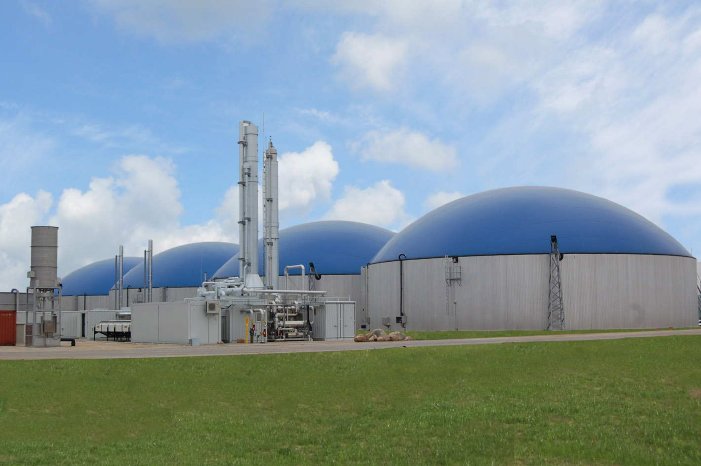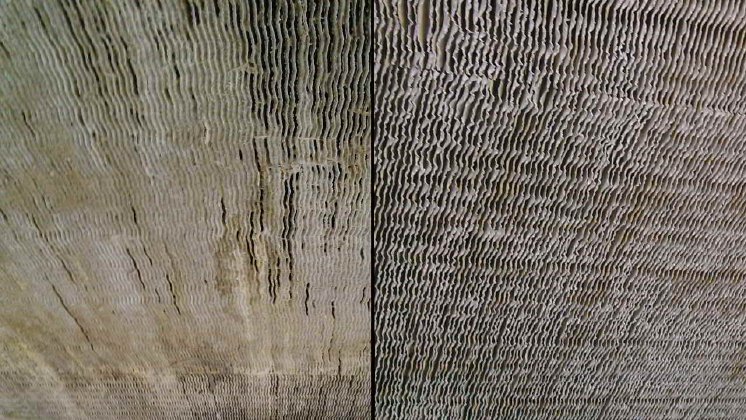At the beginning of September, Kipp Umwelttechnik GmbH was also able to contribute to the proper functioning of the plant. The task was the cleaning of heat exchangers. More specified it was about 30 square meters strongly calcified heat exchangers. Those heat exchangers already lost noticeably efficiency, which led to a significant increase in operating costs. For Kipp Umwelttechnik GmbH it was not the first time to work at a biogas plant where not electricity, but biogas is produced. However, Nordmethan GmbH’s plant was by far the largest one until now.
Cleaning heat exchangers with the JetMaster-Process by mycon GmbH
Cleaning strongly calcified heat exchangers – more precisely table coolers – is a particularly challenging task. Table coolers consist of axial ventilators underneath the ventilators are tubes surrounded by sensitive lamellas. The distance between the lamellas and the floor is usually 50 to 100 cm. A refrigerant or a liquid to be cooled, is passed through the tubes. Due to the density of the lamellas, the interstices are difficult to reach for cleaning. The more the lamellas become polluted, the higher is the required energy to reach the desired cooling capacity.
The heat exchanger cleaning at the plant in Arneburg, commissioned by Nordmethan GmbH, consisted of table coolers with ten axial ventilators and a lamella area of around 30 squaremeters. According to the operator of the plant, cleaning by another service provider last year was not very successful, so the planned cleaning interval could only be met very closely.
In many cases, heat exchanger cleaning is carried out by means of a spraying process with chemicals. This type of cleaning consumes considerable resources and is not environmentally friendly. Success is also not always achieved. Cleaning with high-pressure cleaners also consumes considerable water resources. Here mainly two problems exist: 1. the jet often does not penetrate the entire construction depth of the heat exchanger, so it is only superficially cleaned, and 2. the dense jet can also quickly damage the sensitive lamellas when it is subjected to an oblique impact. Kipp Umwelttechnik GmbH successfully carried out the heat exchanger cleaning with the aid of the JetMaster process and additional combination devices from the sister company mycon GmbH. A special advantage of this process: Kipp Umwelttechnik GmbH was able to clean the heat exchangers while they were running. It was not necessary to switch off the table coolers.
Heat exchanger cleaning leads to more efficiency – Nordmethan GmbH is enthusiastic
Sven Staffa, Operations Manager at Nordmethan GmbH:
„We are very satisfied with the cleaning of the heat exchangers. We will use Kipp Umwelttechnik's services in other locations as well.”
Georg Vernickel, Plant Engineer at Nordmethan GmbH:
„After the heat exchangers have been cleaned, the performance of the table coolers is nearly the same as the values immediately after the installation. The employee of Kipp Umwelttechnik did a really good job. Even after half of the cleaning, much greater success could be seen than after the last cleaning operation.”
In addition to the reduced operation costs, heat exchangers cleaned in a professional manner, has the following advantages for the operator:
- Deep cleanings extend the cleaning interval,
- The operating time of the heat exchangers is lengthened because throughout pollution, corrosion may emerge. During a professional cleaning these pollution can be removed almost completely.
Source Picture 1: Nordmethan GmbH
Source Picture 2: Kipp Umwelttechnik GmbH
Press contact: Maike Küppershaus, Kipp Umwelttechnik GmbH – m.kueppershaus@kipp-umwelttechnik.de



